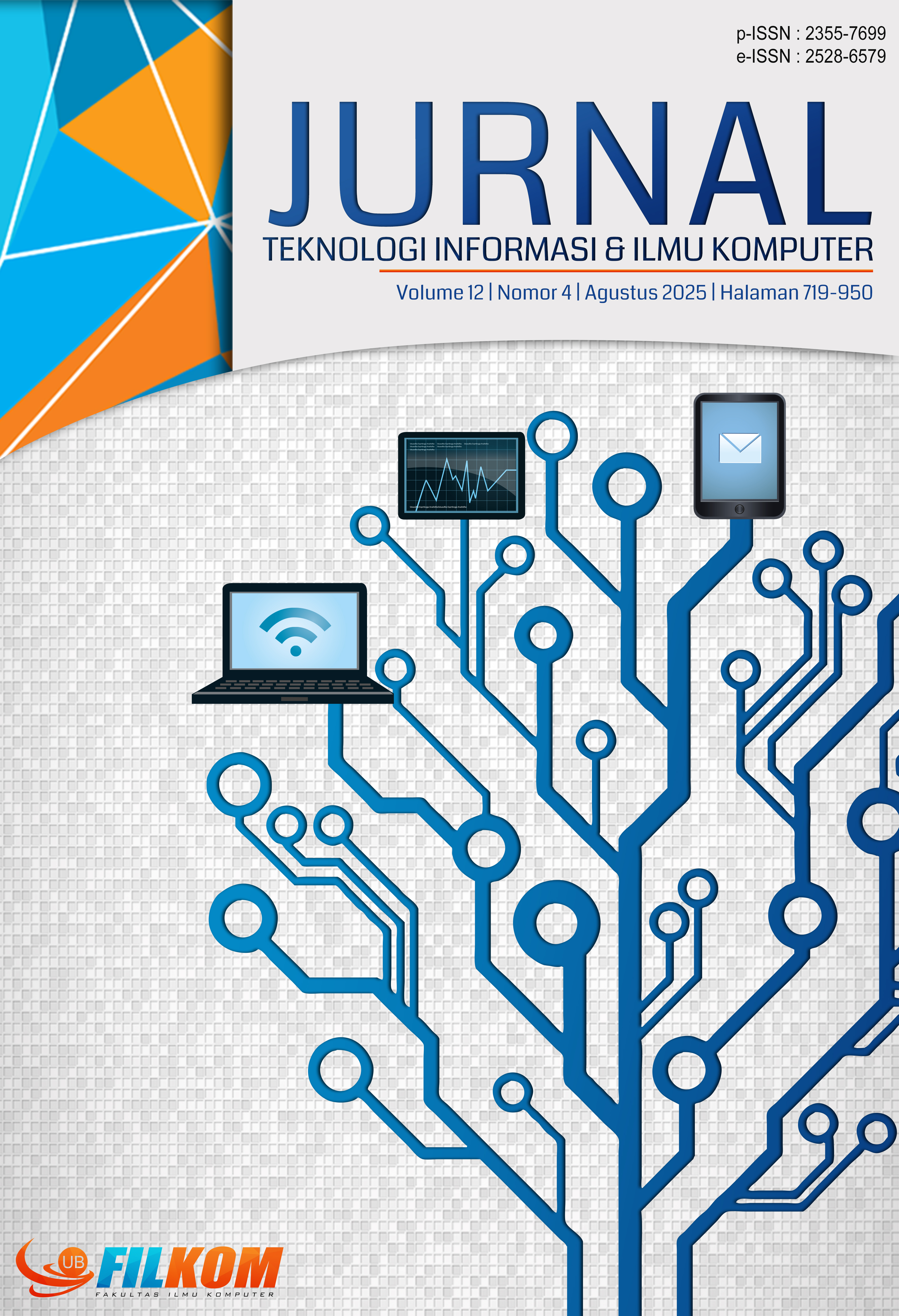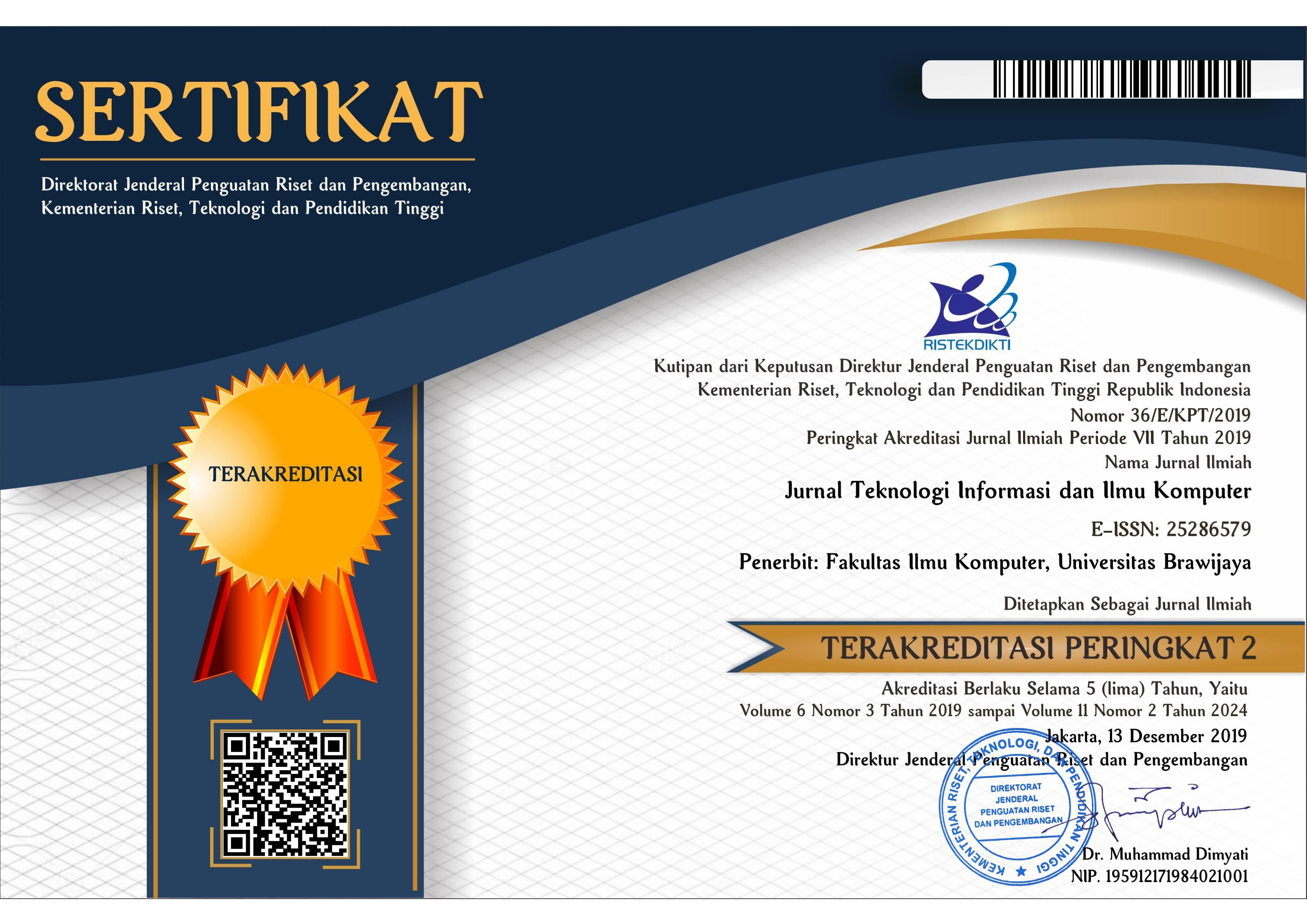Analisis Sentimen Berbasis Aspek Pada Aplikasi Elektronik Survei Kepuasan Masyarakat (E-SKM) Jawa Tengah Menggunakan Indobert
DOI:
https://doi.org/10.25126/jtiik.124Kata Kunci:
NLP, analisis sentimen, ABSA, IndoBERTAbstrak
Perkembangan tentang Natural Language Processing (NLP) semakin berkembang dengan pesat, salah satunya yaitu dalam bidang analisis sentimen. Dalam dunia bisnis, analisis sentimen sangat diperlukan untuk mengetahui dan memahami persepsi pelanggan terhadap produk yang telah didapatkan dari perusahaan. Hal yang sama juga berlaku pada sektor pemerintahan. Pemerintah sebagai penyelenggara pelayanan publik harus dapat mengetahui persepsi dari pengguna layanan terhadap penyelenggaraan pelayanan publik tersebut sebagai bahan perbaikan kualitas layanan. Aplikasi E-SKM merupakan aplikasi milik Pemerintah Provinsi Jawa Tengah yang saat ini hanya mengolah nilai survei layanan meliputi sembilan aspek pertanyaan, sedangkan data saran/masukan pada aplikasi ini belum dimanfaatkan lebih lanjut. Pada penelitian ini, dilakukan analisis sentimen pada data saran/masukan tersebut untuk menggali informasi tambahan yang dapat meningkatkan pemahaman pemerintah terhadap kepuasan pengguna layanan. Metode yang diusulkan yaitu menggunakan pendekatan analisis sentimen berbasis aspek menggunakan model IndoBERT. Pendekatan berbasis aspek ditujukan agar dapat diketahui aspek apa saja yang paling banyak dibicarakan oleh pengguna layanan, terutama yang berhubungan dengan sembilan aspek pertanyaan tersebut. Pada penelitian ini juga digunakan kamus leksikon sebagai pelabelan data, kemudian pendekatan berbasis aturan (rule-based) digunakan dalam proses klasifikasi aspek yang berkaitan dengan sembilan aspek pertanyaan. Selain itu, penelitian ini bertujuan untuk mengukur kemampuan model IndoBERT dalam proses klasifikasi sentimen dengan beberapa skenario yang berbeda. Dari hasil analisis, model evaluasi IndoBERT berjalan dengan baik. Hal ini dilihat dari nilai rata-rata parameter evaluasi seperti akurasi, precision, recall, dan f1-score mencapai 95%. Penerapan model ini memiliki kontribusi pada data aplikasi E-SKM untuk mendapatkan informasi sentimen dan aspek pada data pelayanan publik di pemerintahan yang dapat digunakan sebagai bahan pengambilan keputusan pada level manajemen kebijakan.
Abstract
The field of Natural Language Processing (NLP) is rapidly advancing, particularly in sentiment analysis. In the business world, sentiment analysis is essential for understanding customer perceptions of products they have received from a company. The same applies to the government sector, where it is crucial for public service providers to gain insight into user perceptions of public services as a basis for service improvement. The E-SKM application, owned by the Central Java provincial government, currently processes only service survey scores covering nine question aspects, while suggestions/feedback data from this application have not yet been fully utilized. In this study, sentiment analysis was conducted on the suggestion/feedback data to extract additional insights that could improve understanding of user satisfaction. The proposed method involves an aspect-based sentiment analysis approach using the IndoBERT model. This aspect-based approach aims to identify the aspects most frequently mentioned by service users, particularly those related to the nine survey aspects. A lexicon-based approach was used for data labeling, followed by a rule-based approach for classifying aspects associated with the nine questions. Additionally, this study aims to assess the performance of the IndoBERT model in sentiment classification across several scenarios. Evaluation results indicate that IndoBERT performs well, with average metrics such as accuracy, precision, recall, and F1-score reaching 95%. The implementation of this model contributes to the E-SKM application data by providing sentiment and aspect information on public service data within the government, which can be used as a basis for decision-making at the policy management level.
Downloads
Referensi
ALQARYOUTI, O., SIYAM, N., dan SHAALAN, K. 2024. Aspect-based sentiment analysis for government smart applications customers’ reviews. Applied Computing and Informatics, 20(1/2), 142-161.
ASSIRI, A., GUMAEI, A., MEHMOOD, F., ABBAS, T., dan ULLAH, S. 2024. DeBERTa-GRU: Sentiment Analysis for Large Language Model. Computers, Materials & Continua, 79(3), 4219-4236.
BRAUWERS, G., dan FRASINCAR, F. 2021. A survey on aspect-based sentiment classification. ACM Computing Surveys, 54(3), 1-37.
CHAUDHARY, A., PANDEY, D. K., dan AGRAWAL, A. 2022. Aspect-based sentiment analysis: A survey of the state-of-the-art. Expert Systems with Applications, 204, 117547.
CITRA, B. S. A., SETIONO, B., PANGARIBUAN, C. H., dan AMBARWATI, M. F. L. 2021. The Influence of Service Quality on Public Satisfaction and Public Trust: A Study on Jakarta Public Health Services during COVID-19 Pandemic. Journal of Business, Management, and Social Studies, 1(1), 48-57.
DEVLIN, J., 2018. BERT: Pre-training of deep bidirectional transformers for language understanding. arXiv preprint, arXiv:1810.04805.
DIEKSON, Z. A., PRAKOSO, M. R. B., PUTRA, M. S. Q., SYAPUTRA, M. S. A. F., ACHMAD, S., dan SUTOYO, R. 2023. Sentiment analysis for customer review: Case study of Traveloka. Procedia Computer Science, 216, 682-690.
ELIFNEH, Y. W., BRAHMA, D., JAGADISH, G. dan GIRMA, Y., 2020. Customers’ satisfaction in ATM service: empirical evidence from the leading bank in Ethiopia. International Journal of Engineering and Management Research, 10(1), pp. 126-134.GUEROLA
NAVARRO, V., OLTRA-BADENES, R., GIL GOMEZ, H., and GIL-GOMEZ, J. A., 2021. Research model for measuring the impact of customer relationship management (CRM) on performance indicators. Economic Research-Ekonomska Istraživanja, 34(1), pp. 2669–2691.
GU, T., HE, Z., LI, Z., dan WAN, Y. 2025. Information-assisted and sentiment relation-driven for aspect-based sentiment analysis. Expert Systems with Applications, 278, 127308.
HARIRI, R. H., FREDERICKS, E. M. dan BOWERS, K. M., 2019. Uncertainty in big data analytics: survey, opportunities, and challenges. Journal of Big Data, 6(1).
HIDAYAT, A., SAPUTRA, R., dan RAHMAN, F. 2023. Analisis Pengaruh Penerapan Stopword Removal pada Performa Klasifikasi Sentimen Tweet Bahasa Indonesia. Jurnal Teknologi dan Sistem Komputer, 11(3), 235–242.
IBNU DAQIQIL, H., SAPUTRA, H., SYAMSUDHUHA, KURNIAWAN, R. dan ANDRIYANI, Y., 2024. Sentiment analysis of student evaluation feedback using transformer-based language models. Indonesian Journal of Electrical Engineering and Computer Science, 36(2), pp. 1127-1139 (pp. 168-177).
JADHAV, A., dan SONAR, P. 2021. Aspect based sentiment analysis datasets: A comparative study. Procedia Computer Science, 185, 578-587.
KOTO, F., WINATA, G. I., SIDI, R., dan MARDIYANTO, R., 2020. IndoLEM and IndoBERT: A benchmark dataset and pre-trained language model for Indonesian NLP. arXiv preprint, arXiv:2011.00677.
MA, Y., PENG, H., dan CAMBRIA, E. 2022. Targeted aspect-based sentiment analysis via embedding commonsense knowledge graph. IEEE Transactions on Affective Computing.
NABIILAH, G. Z., PRASETYO, S. Y., dan IZDIHAR, Z. N. 2023. BERT base model for toxic comment analysis on Indonesian social media. Procedia Computer Science, 216, 714-721.
PINTO LUQUE, E. B., 2023. An integrated NLP approach to sentiment analysis in satisfaction surveys. arXiv preprint, arXiv:2307.11771.
ROMERO SUBIA, J. F., JIMBER-DEL RIO, J. A., OCHOA-RICO, M. S. dan VERGARA-ROMERO, A., 2022. Analysis of citizen satisfaction in municipal services. Economies, 10(9), p. 225.
SELVAKUMAR, B., dan LAKSHMANAN, B. 2022. Sentimental analysis on user’s reviews using BERT. Materials Today: Proceedings, 62, 4931-4935.
ZHANG, W., LI, X., DENG, Y., BING, L. dan LAM, W., 2022. A survey on aspect-based sentiment analysis: Tasks, methods, and challenges. IEEE Transactions on Knowledge and Data Engineering, 35(11), pp. 11019-11038.
ZIEMSKI, M., CHAURASIA, S., dan SCHERER, R. 2020. Aspect extraction in sentiment analysis: Comparative analysis and survey. Artificial Intelligence Review, 53, 2357-2390.
Unduhan
Diterbitkan
Terbitan
Bagian
Lisensi
Hak Cipta (c) 2025 Jurnal Teknologi Informasi dan Ilmu Komputer

Artikel ini berlisensiCreative Commons Attribution-ShareAlike 4.0 International License.

Artikel ini berlisensi Creative Common Attribution-ShareAlike 4.0 International (CC BY-SA 4.0)
Penulis yang menerbitkan di jurnal ini menyetujui ketentuan berikut:
- Penulis menyimpan hak cipta dan memberikan jurnal hak penerbitan pertama naskah secara simultan dengan lisensi di bawah Creative Common Attribution-ShareAlike 4.0 International (CC BY-SA 4.0) yang mengizinkan orang lain untuk berbagi pekerjaan dengan sebuah pernyataan kepenulisan pekerjaan dan penerbitan awal di jurnal ini.
- Penulis bisa memasukkan ke dalam penyusunan kontraktual tambahan terpisah untuk distribusi non ekslusif versi kaya terbitan jurnal (contoh: mempostingnya ke repositori institusional atau menerbitkannya dalam sebuah buku), dengan pengakuan penerbitan awalnya di jurnal ini.
- Penulis diizinkan dan didorong untuk mem-posting karya mereka online (contoh: di repositori institusional atau di website mereka) sebelum dan selama proses penyerahan, karena dapat mengarahkan ke pertukaran produktif, seperti halnya sitiran yang lebih awal dan lebih hebat dari karya yang diterbitkan. (Lihat Efek Akses Terbuka).















